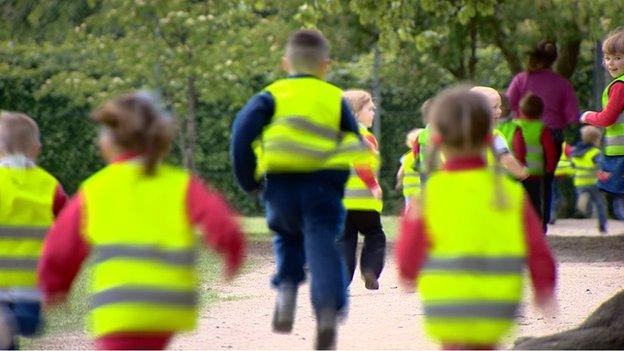Ten years of the Daily Mile celebrated worldwide
- Published

Eight hundred children did their Daily Mile in Baxter Park, Dundee, to mark a decade since the scheme began
A Scottish head teacher who 10 years ago set up a scheme to get children running or walking a mile a day is delighted it has been taken up by three million pupils across the world.
Children at 14,000 primary schools are now taking part in the Daily Mile and reaping the benefits.
New research suggests that those involved are mentally and physically sharper than those who are not.
Founder Elaine Wyllie said she had seen children becoming more focused.
To mark the 10-year anniversary of the scheme, 800 children from local schools in Dundee ran together in Baxter Park on Thursday, while 350,000 children around the world also did their Daily Mile.
Ms Wyllie came up with the idea of the Daily Mile while working at St Ninian's Primary school in Stirling after noticing how unfit the pupils had become - some of them could not run around a field without stopping.
She told BBC Radio's Good Morning Scotland programme: "We introduced 15 minutes at the children's own pace, every day and we were absolutely amazed - firstly that the children really liked it and then at the very quick benefits we saw, not just in physical health but the mental health and happiness of the children.
"They were very cheerful when they came back in and were very settled. Their focus in the classroom and their behaviour improved - what teachers consistently reported to us was that they were more 'learning ready' and able to settle down to their work."

Elaine Wyllie set up the Daily Mile 10 years ago after noticing how unfit children at her school had become
She added: "We did think the Daily Mile would work in any school. Children are the same everywhere. We absolutely did not think for one minute there would be 14,000 schools doing it in 2022."
The new study looked at the long-term effects on psychological health of school-based running programmes such as the Daily Mile, which involves children taking a 15-minute break from class to do physical activity.
Researchers at the universities of Edinburgh, Stirling, and Highlands and Islands observed 6,000 pupils aged nine to 11 who undertook a series of cognitive function tests.
Teachers guided pupils through a bleep test to measure fitness and then pupils completed bespoke computer-based tasks to measure attention and memory, and reported their own wellbeing.
The team used statistical models to analyse the impact of a long-term running programme on a pupil's cognition, wellbeing and fitness.
They also considered other factors, such as age, sex and socio-economic status.

Pupils at St Ninians Primary in Stirling were the first to do the Daily Mile
Findings showed fitness had a small but detectable association with better memory and thinking skills in pupils who had taken part for less than two months.
Participating for longer than three months had a significant association with higher fitness levels, however, no benefits for cognition and wellbeing were found.
Dr Josie Booth, from the University of Edinburgh's Moray House school of education and sport, said: "Taking part in the Daily Mile each day can improve pupil fitness and while we did not find longer-term benefits for cognition and wellbeing, there was no substantial negative impact either.
"The health benefits of physical activity coupled with the immediate benefit, which supports learning, makes such physical activity breaks worthwhile and should be considered by class teachers and school management, as well as education policy makers."
- Published10 May 2018

- Published4 June 2015
